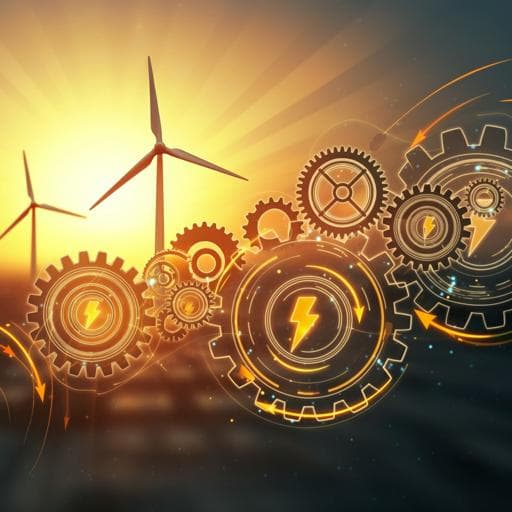
Political Science
Policy failures and energy transitions: the regulatory bricolage for the promotion of renewable energy in Mexico and Chile
M. Natorski and I. Solorio
The research on energy transition in Latin American and Caribbean (LAC) countries has grown substantially over the past decade, highlighting the proactive role of governments in international climate negotiations and examining local impacts and social opposition, especially on indigenous lands. Traditional renewable energy use in the region has centered on biomass and hydropower, but reliance on large hydropower faces growing societal resistance, climate vulnerability, and energy-water-food nexus challenges. Given demand growth, climate change, and weak diversification of energy supplies, nearly all LAC governments have adopted plans to promote renewables beyond hydropower, with notable growth in wind and solar in Mexico and Chile. Broader electricity reforms toward market liberalisation and regulatory change have reshaped the sector to attract private investment and increase electrification. This article argues that recognition of energy policy failure triggers regulatory reforms leading to policy bricolage and a reconsideration of the state’s role in the sector. Focusing on Mexico and Chile—two regional leaders after reforms—the study adopts discursive institutionalism to show how framing crises as policy failures (critical vs. ordinary) structured energy policy changes and the shift in balancing energy trilemma priorities. It addresses three gaps: linking policy failures to energy transitions, connecting failure framing with the design and adjustment of policy instruments (e.g., commitments, auctions, certificates, quotas, subsidies), and explaining how attribution of responsibility for failure can shift the role of the state toward more or less involvement. The paper analyzes evolutionary, cumulative regulatory changes in Mexico and Chile’s power sectors, showing how crises linked to incentive structures and liberalisation challenges spurred policy bricolage combining new and old ideas and instruments. It then presents the analytical framework, methodology, case studies, discussion, and conclusions on policy failures’ dynamics and implications.
Prior work on LAC energy transitions emphasizes the region’s role in climate negotiations, the historic prominence and emerging limits of hydropower, and social implications of energy projects, including conflicts on indigenous lands and socio-environmental impacts. Studies link energy transitions to broader electricity sector reforms, market liberalisation, and changing state roles; globalization is also cited as a structural driver. Research on policy instruments in LAC (political commitments, auctions, green certificates, quotas/targets, subsidies) has examined their role in diffusing renewables. However, there has been limited systemic analysis of how the framing of policy failures shapes these reforms. This article contributes by: (1) explicitly linking policy failure recognition to energy transition dynamics; (2) integrating political debates about failures with instrument design and adjustment; and (3) advancing understanding of how the attribution of responsibility for failure can reconfigure the balance between private actors and public control in the energy sector. The framework draws on discursive institutionalism and distinguishes critical failures (contradictions between policy goals and results that contest dominant ideas) from ordinary failures (contradictions between goals and instruments where normative underpinnings remain valid), expecting different forms of policy bricolage in each case.
The study employs process tracing to analyze temporal causality between policy failures and policy bricolage in Mexico and Chile, using an explaining-outcome variant focused on case-specific explanations. Data collection proceeded in three steps: (1) timeline reconstruction of sector evolution and renewable diffusion milestones, identifying energy crises (supply disruptions) and policy responses (e.g., new laws) via systematic literature review and primary/secondary sources and news; (2) legal-regulatory content analysis to assess energy law principles related to sustainability, security, and accessibility, focusing on general parts of laws adopted post-failure; and (3) discursive analysis of public debates to identify diagnostic, prognostic, and motivational frames linking energy crises to regulatory changes using governmental documents, statements by key actors, parliamentary debates, and national press coverage. Case selection followed a method of agreement: despite different initial conditions (systems, paradigms, ownership, resource availability), both countries experienced policy failures and subsequently became regional renewable leaders, with wind and solar dominating non-hydro additions. The approach aims to craft case-specific causal narratives rather than generalizable mechanisms.
- Recognition of policy failures opens windows for regulatory reforms that support renewable energy diffusion via policy bricolage combining new and old ideas and instruments within the energy trilemma (security, sustainability, equity).
- Two distinct failure framings lead to different policy pathways: Mexico’s crisis was framed as a critical failure of state-led energy nationalism and public service provision; Chile’s as an ordinary failure of the liberal market model’s instruments and market architecture.
- Mexico: A creeping crisis culminating in the 2009 closure of LyFC (tipping point) enabled 2013–2015 reforms (constitutional change, 2014 Electricity Industry Law, 2015 Energy Transition Law). These unbundled the state monopoly, opened foreign investment, created a wholesale market, established an independent system operator (CENACE), strengthened the regulator (CRE), and introduced clean energy certificates and technology-neutral auctions. Result: shift from state ownership to a more regulatory state and rapid clean energy entry. Private producers’ installed capacity share rose from 10.7% (2000) to 35.2% (2008). Subsequent attempts under AMLO sought to reverse market mechanisms and reintegrate CFE, illustrating ongoing bricolage twists.
- Chile: After blackouts (1998–1999) and the 2007–2008 disruption (drought plus Argentine gas cut), failures were framed as ordinary (market design and investment signals), prompting incremental regulatory adjustments: Short Laws I & II (2004–2005), 2008 Renewable Energy Law with NCRE quotas (amended 2013 to 20% by 2025), creation of Ministry of Energy (2010), 2016 Transmission Law with unified ISO and National Electric System, Energy 2050 strategy (target at least 70% NCRE by 2050). Hydropower mega-projects faced social opposition; the HidroAysén project was terminated in 2014.
- Auction reforms in Chile increased competition and reduced prices: number of bidders rose from 1 (2012) to 24 (2017); average prices fell by ~75% from USD 131.4/MWh (2012) to USD 32.5/MWh (2017), with growing shares of wind and solar contracted.
- Bricolage outcomes differ by framing: Mexico layered and displaced core policy ideas (market logics with residual public service roles), while Chile adjusted instruments within a liberal paradigm, strengthening state planning/supervision to enhance security and sustainability.
- Renewable energy diffusion in both cases was enabled by recalibrating energy trilemma priorities (Mexico: affordability/efficiency/competitiveness; Chile: security of supply and environmental sustainability) and reconfiguring the state’s role (weakened direct participation in Mexico; strengthened regulatory intervention in Chile).
The findings demonstrate that framing energy crises as policy failures is a key driver of energy policy change and renewable diffusion in LAC contexts marked by incentive collapses and trilemma tensions. In Mexico, a critical failure frame delegitimized state-led energy nationalism, enabling paradigmatic reform—liberalisation, market creation, and regulatory restructuring—through which clean energy (including wind and solar) served both as a competitiveness tool and as legitimation for private participation. In Chile, energy disruptions highlighted ordinary failures of market instruments to assure security and affordability, catalyzing incremental, instrument-focused reforms that softened the liberal orthodoxy by increasing state planning, supervision, and long-term strategic coordination (e.g., quotas, improved auctions, transmission integration). These different trajectories reflect political capacities to contest dominant paradigms rather than the objective nature of the crises. Both pathways yielded policy bricolage that rebalanced energy trilemma priorities—Mexico toward affordability and efficiency, Chile toward security and sustainability—while maintaining hybrid features (coexistence of market mechanisms and state roles). The dynamics also reveal vulnerability to political shifts: Mexico’s subsequent policy reversal attempts (e.g., halting auctions, limiting private generation) illustrate how new claims of failure can precipitate further bricolage. Broader societal debates about cost and benefit distribution, accessibility, and environmental impacts underpin support for or resistance to transition trajectories in both countries.
Recognition of policy failures creates opportunities for regulatory reforms that advance renewable energy diffusion in LAC countries, either by facilitating liberalisation (Mexico) or by maintaining a liberal framework while reinforcing state intervention to ensure security and sustainability (Chile). Distinguishing critical from ordinary failure frames helps explain the scope of policy response: critical failure frames justify paradigmatic shifts in policy ideas; ordinary failure frames justify instrument adaptation within existing paradigms. In both cases, policy failures enabled policy bricolage merging old and new ideas and instruments and rebalancing energy trilemma priorities. The inclusion of new renewable sources depends on initial sector conditions and on how crises are debated and framed, leading to different outcomes for the state’s role. As energy policy becomes more politicized, technical narratives alone are insufficient; political, social, economic, and environmental implications and conflicts (including around renewable projects) shape transition pathways. Future research should track evolving discourse frameworks across the region to better understand policy change and the risks of retreat or reversal.
The study focuses on two country cases using explaining-outcome process tracing and qualitative discourse and legal-regulatory analysis; as acknowledged, the goal is to craft case-specific explanations rather than to develop generalizable mechanisms. Reliance on publicly available documents, parliamentary debates, and media sources may introduce selection and interpretation biases. The comparative scope (Mexico and Chile) limits external validity across the diverse LAC region. Quantitative causal estimation of specific instruments’ effects (e.g., auctions, certificates) is beyond the article’s scope.
Related Publications
Explore these studies to deepen your understanding of the subject.







